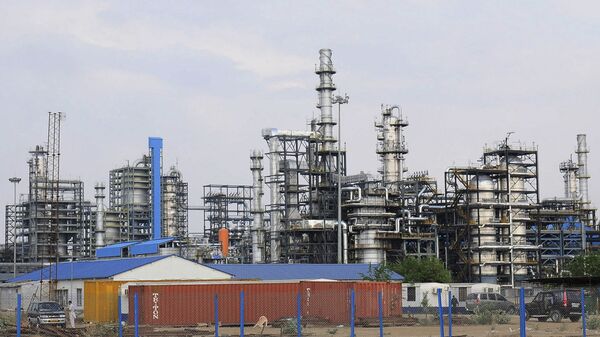"OPEC should also [be] looking at consumer’s interest. In the era of technology and … alternative fuels, we are convinced oil is going to play a bigger role and a longer role in the energy need of the world, but prices should be reasonable and very responsible. To fulfil that expectation, don’t go for a further cut. Make the prices very reasonable", Pradhan said.
India is calling on the organisation to appreciate the changing global technological level and ensure reasonable oil prices, which would be beneficial both for consumers and for producers, the minister stressed.
"Don’t kill the golden goose, if you want to have an egg for a longer period if you want to have a market for a longer period. Don’t kill the scope in the market. I hope OPEC leaders will be looking into aspect when they will be deciding about the production balance", Pradhan noted.
India has already asked OPEC to abstain from further cuts, since OPEC accounts for 80 percent of India's crude oil imports, and therefore any cut could jeopardise the country's energy security.
India Wants 'Competitive Crude at Competitive Price' From Russia
"We all are talking to our counterparts, our state-owned companies are talking to their counterparts in Russia, [about] how they will bring competitive crude oil at a competitive price. They are searching for a different model of trading, how it can come to India. We are working to bring Russian crude to the Indian market", Pradhan said, when asked about steps taken toward boosting energy cooperation.
The minister praised Russia as a "preferred destination of origin" in terms of oil and gas, reaffirming India's plans to invest in Rosneft's petrochemical cluster in the country's the Far East.
"Our preferred destination of origin is Russia for oil and gas sector. Since last two decades, we have this engagement, we have already had an investment in Sakhalin, the Far East part of Russia, and recently we are planning to invest in the new eastern cluster development by Rosneft … It’s a very progressive project", Pradhan added.
He qualified India's cooperation with Russia as "very reliable, very old and very dependable", expressing the belief that it would continue.
"We are of this agreement … We know Russia is playing a very constructive role in the OPEC+ forum. Here we are not in a business of newspaper editing, we are in a business of governance, so there is no deadline. In a governance model, you have to negotiate, you have to discuss, you have to find [the] way, and we are confident that all leaders envision that", the minister said, when asked about how Russia could potentially influence OPEC policies in terms of supply and pricing.
In December, OPEC member states and other oil-producing countries, together known as OPEC+, agreed to reduce overall production by 1.2 million barrels per day in the first half 2019 to stabilise oil prices. The cartel pledged to cut production by 800,000 barrels per day, while non-OPEC countries agreed to reduce it by 400,000 barrels per day. In July, the agreement was extended on the same terms until April 2020.
India Wants Oil Shipping Via Russia's Northern Sea Route to Start ASAP
The minister continued on by saying that India wants oil shipping via Russia's Northern Sea Route to start as soon as possible, as it aspires to see "more navigation" from the partner nation.
"I would be more than happy. More, more navigation from Russia to India. Our old dependable ally. We’ll be more than happy. It should be as early as possible", Pradhan said, when asked about prospects for the oil shipping via the Northern Sea Route to start within one or two years.
Russia and India said in a joint statement, released after their bilateral summit in early September, that they would study the possibility of shipping oil via the Northern Sea Route.
The Northern Sea Route, Russia's main Arctic shipping path, is expected to become a shorter alternative to the passage through the Suez Canal, which is currently the most common route nowadays for delivering cargo from Asian ports to Europe.
Share of Renewables in India's Energy Mix to Grow Manifold in Near Future
"India is moving towards energy transition … Looking at this sector in India, we have our own model of energy transition. When we are talking about energy transition, we are giving much more focus on renewable energy. We will continue to use our old conventional energy sources — whether it is coal or oil — we will continue to use them, but for our incremental requirement, because India is the highest growth point of the energy industry in the world in the near future", the minister stated.
Pradhan said that India was focused on further stepping up renewable energy production to remain a leader in the field. However, he pointed out that the International Solar Alliance (ISA), which was established by New Delhi with the aim of moving away from dependence on fossil fuels and toward solar power, was a tool for creating a sustainable model and one it did not wish to replicate with the Organisation of the Petroleum Exporting Countries (OPEC).
"So, the ISA is a natural outcome of that position that we have taken. I cite one example: four years back India’s renewable energy generating target was 175 gigawatts … Prime Minister Narendra Modi upscaled that target to 450 gigawatts. So, India is already is in a leadership position. We do not want to replicate the ISA with another agency, we want to create a sustainable model for a while, and India wants to take a leadership position in that journey. [The share of renewables in India’s energy mix] will increase multifold … It will take a substantial place in the basket," the minister pointed out.
When asked whether India used any stabilisation mechanisms to protect its energy industry from possible future incidents in the Persian Gulf, Pradhan said that New Delhi was in talks with some countries of the region regarding investments in India's strategic storage, while the United Arab Emirates had already invested in the country's strategic stocks.



